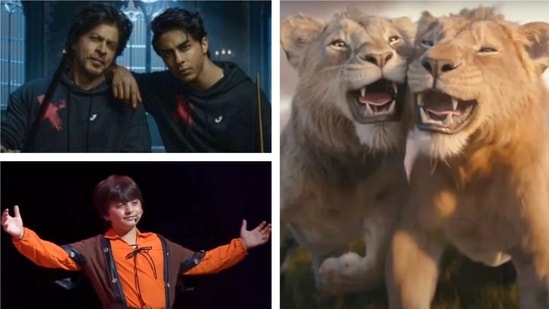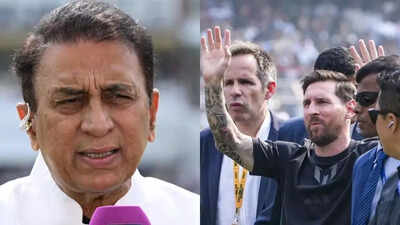Mufasa The Lion King Hindi movie review: It makes perfect poetic sense to cast Shah Rukh Khan as the voice of the titular character, the mighty father of Simba, in Barry Jenkins’ prequel to the 2019 blockbuster. He not only lends his signature thinking man’s vulnerability to a young Mufasa, but also steeps the Disney fable in flavours both deeply local and eerily personal. Mufasa’s origin story is that of Shah Rukh himself – a lost soul in search of his parents destined to rule a kingdom far far away.
(Also Read: Shah Rukh Khan, Abhishek Bachchan and Aishwarya Rai groove to Deewangi Deewangi at AbRam, Aaradhya’s school function)
King of his jungle
In the cult 1994 animated Lion King, the late James Earl Jones lent unparalleled gravitas to Mufasa through his booming, textured voice. In fact, Mufasa: The Lion King pays tribute to that man and that voice right at the beginning. Given the beats of the origin story, if there was any Indian actor who could effortlessly slip into the character’s paws, it’s Shah Rukh Khan. Like Mufasa, the actor also lost his parents at a very young age, and somewhere seems to be in perennial search of them.

In the process, he enters a kingdom days away from his own, where he’s rejected by the lions, but embraced by the head lioness and her cub, Raka. She sees a prince in him, although Mufasa claims that unlike his newfound brother Taka, he doesn’t wish to be scared of principles and burdened with responsibility. Yet, as his journey takes its course, Mufasa becomes exactly that – a king of his dream kingdom, if not by choice, then by destiny. Shah Rukh could very well be the Mumbai counterpart of Mufasa.
It also makes sense that Shah Rukh’s sons – Aryan Khan and AbRam Khan – are also a part of the voice cast. While Aryan’s Simba returns only for a cameo, AbRam shines as the ebulient cub version of Mufasa. The film also tells the story of four generations – from Mufasa’s parents to Simba’s daughter Kiara. It underscores that every generation feels lost, thanks to fear of abandonment, but as Raka’s mother puts it, “You need to be lost first in order to find your way home.” Shah Rukh has often talked about how lost souls always have an edge over others. The resonance becomes more uncanny when at multiple points, Mufasa reassures his loved ones with “Main Hoon Na.”

Beyond Shah Rukh Khan
But one can’t say that Shah Rukh is the only saving grace of Mufasa: The Lion King. The film pretty much stands on his own. If John Favreau had the Herculean task of bringing to tangible life the 1994 animated classic in The Lion King (2019), Barry Jenkins also does a fine job of giving Mufasa his own past, fears, journey, and value system. And unlike most Hindi dubbed versions of Hollywood films out there, the dialogues and even the songs land fairly smoothly throughout. Fortunately, the Hindi isn’t contemporarised or dumbed down for the Gen-Z. It flows seamlessly, yet also offers lines you’d remember for long.
When Taka wants to go hunting like his mother and Mufasa, his father dozes off and says, “Humare khwabon se hi riyasat mehfooz rehti hai” (Our kingdom is protected only by our dreams), which reflects the double standards of the lions, who merely sleep and posture as kings of the jungle, while it’s the lionesses who actually do the work – hunt and raise cubs. The father also says, “Fareb toh nawabo ka hathiyar hota hai” (Treachery is a king’s strength). Or when Mufasa describes his dream land as “manzil ke pas, nazar ki hadh se pare” (close to destination, beyond the limit of the sight). These are dialogues that have not just been translated, but crafted with a lot of thought and skill.
The same is the case with Mufasa’s association with water. Moments after his mother glorifies spring for him in childhood, rains unleash hell on him by separating him from his parents after the cub is flown away by a deluge. He has a lifelong fear of water – at one point, he’s willing to fight a pride of lions double his size because the only other option is to leap into the river. Mufasa admits that he fears water also because he wants to keep away from his own reflection – which reminds him of his troubled past. But when he falls in love, he’s able to look through a wall of ice into his lover’s eyes, instead of his vision getting obstructed by his own reflection. Subtle hints at the growth in his arc make the film more layered than upfront.
Also, at the heart of Mufasa: The Lion King is the perennial question: who is an outsider? Mufasa is considered one when he’s thrown into another kingdom. Rafiki is also banished from his tree because his philosophical ways are too evolved for his breed of monkeys. The antagonistic white lions are also labelled as hurt outsiders who want to take vengeance by claiming what’s not theirs. And by the end, Taka, who was born a prince, ends up being an outsider, because of his actions, and not because of his blood. Mufasa shows that being the apex predator entails a mix of destiny and action. Who else but Bollywood’s King Khan to translate that then?






